SINGAPORE: When her son Caleb Chen was in Primary Six last year, Angela Ong began making intense preparations for his Primary School Leaving Examination (PSLE) during the June school holidays.
If there was no schoolwork planned, there would be tuition work. And if not the latter, then there were assessment books to complete, said Caleb, 12, about his holiday schedule.
He was not the only one at home doing revision.
“To help Caleb with science, I tried to memorise the science notes that were given to him,” said Ong, who began taking half-day leave by the time it was the September term break.
Some parents are going one step further. They are attending tuition workshops to be better prepared for their children’s PSLE.
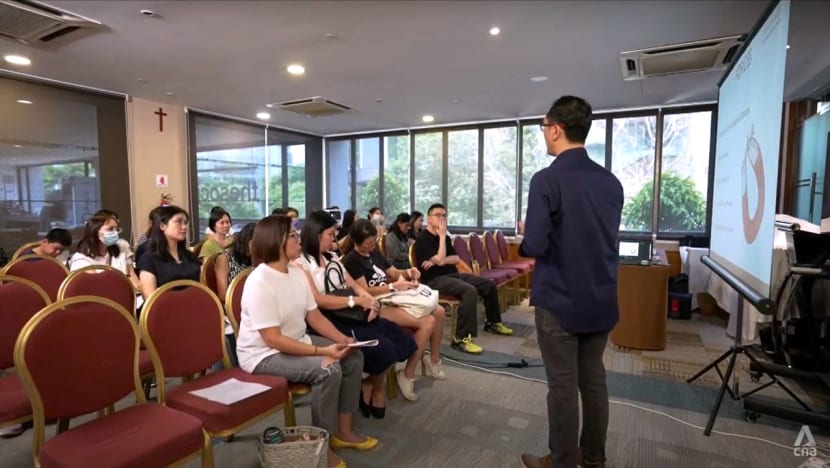
A parent workshop on the PSLE science topic of forces and energy.
For parent Karen Law, attending a workshop this January made her “feel more confident” about covering her son’s science topics.
“When I go through his papers or his homework, maybe I’ll have a better understanding of whether he’s doing it right,” she said. “I just want to make sure that everything’s on track.”
Another workshop participant, Denise Chow, said the key takeaways from their session were the “common pitfalls” of PSLE science and “answering techniques”.
“I can’t go (into) battle for (my son). But I can prepare with him for the battle,” she said.
“I always give (my children) the (freedom) to choose what they want in life. But there are bases of life choices that I have to be part of, and grades and education are a very important thing to me.”
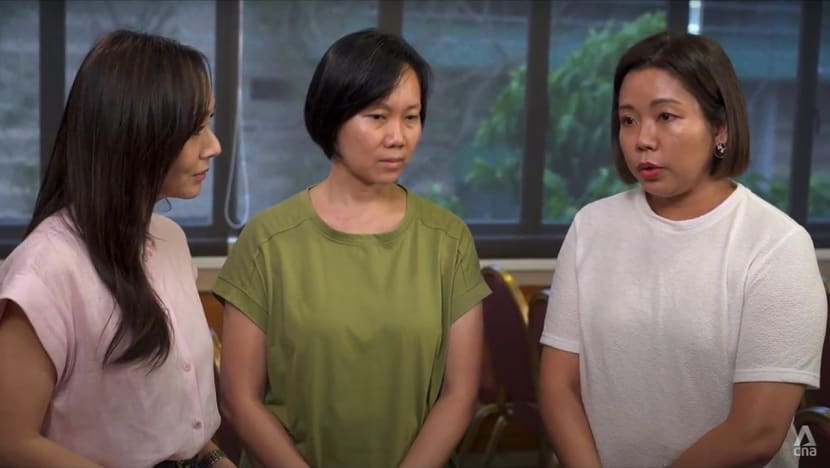
Television host Diana Ser interviewing Denise Chow (right) and Karen Law (centre).
Indeed, according to a survey of 1,000 parents of Primary Five and Six pupils, 99 per cent said good PSLE scores were important.
This is the first such nationwide survey — commissioned by CNA — since the change of scoring system in 2021 from the T-score to Achievement Levels (ALs).
In the survey, 85 per cent of parents also said their children were stressed out about the PSLE, while 64 per cent of parents themselves were stressed out.
Parents are in fact “more stressed” since the change of scoring system, observed science tutor Jayce Or, who started PSLE prep workshops for parents in 2017.
What is driving the obsession with grades, and what is it doing to Singapore’s children? The programme Regardless of Grades, which airs tonight (March 29), finds out how much has changed since the recent moves to reduce the overemphasis on academic results.
Under the current PSLE scoring system, which spans eight ALs, the total scores range from four to 32, which are “less finely differentiated” — as intended by the Ministry of Education (MOE) — than the previous range of more than 200 aggregate scores.
For example, the previous grade A, which was 75 to 90 marks, is now split into AL2 (85 to 89), AL3 (80 to 84) and AL4 (75 to 79), with AL1 for 90 marks and above.
But in the past, pupils could “drop two to four marks” and still get an A, said Or, the founder of enrichment centre Germinate Learning.
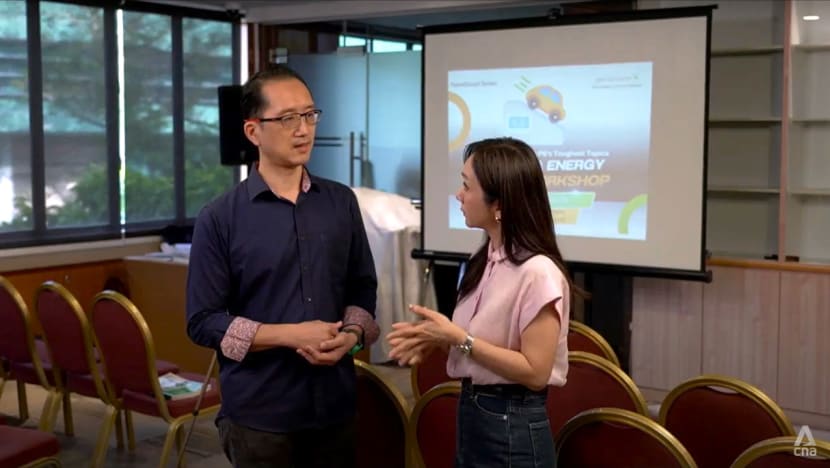
Ser speaking to science tutor Jayce Or.
Parents of children scoring within this range are now more stressed because “any careless mistake”, he said — citing PSLE science multiple-choice questions, which carry two marks each — could mean the difference between, say, AL2 and AL3.
That difference in grade could have an impact on a child’s admission to a particular secondary school, if they do not achieve the cut-off score.
And getting into a secondary school of their choice is what lies behind most parents’ views on PSLE scores.
According to CNA’s survey, 69 per cent listed this as a reason why grades were important. And 64 per cent said a good score was a stepping stone to a good future or career.


For one Primary Six pupil last year, Adyant Chandrasekar, his careless mistakes “here and there” were the reason why his father sent him to a mathematics boot camp.
“My dad’s trying to make me get full marks,” the 12-year-old told CNA on the second day.
These kinds of boot camps are typically held during school holidays, and many of them focus on helping Primary Five and Six pupils prepare for the PSLE.
Fees can go up to S$500 for a five-day camp, but it could still be oversubscribed.
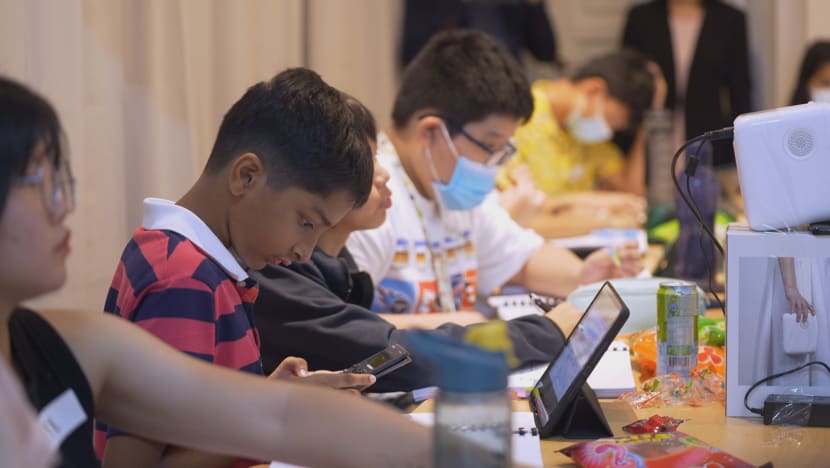
Adyant Chandrasekar, 12, at his mathematics boot camp.
Caleb, too, was at a boot camp during the September term break, which led him to express tiredness and question why his mum had enrolled him in the camp. “But I know that it’s for my own good,” he said.
Nowadays, regular tuition is not enough for some parents. Besides boot camps, there are academic enrichment centres offering unconventional teaching methods, from memory practices that stimulate the right brain — or so it is claimed — to speed calculations.
CNA’s survey found that 28 per cent of parents have enrolled their child for such enrichment classes in preparation for the PSLE.
Most parents (60 per cent), however, send their children to tuition classes. Among them, 65 per cent send their children to three or four classes, and for another 6 per cent, it is five or more classes.
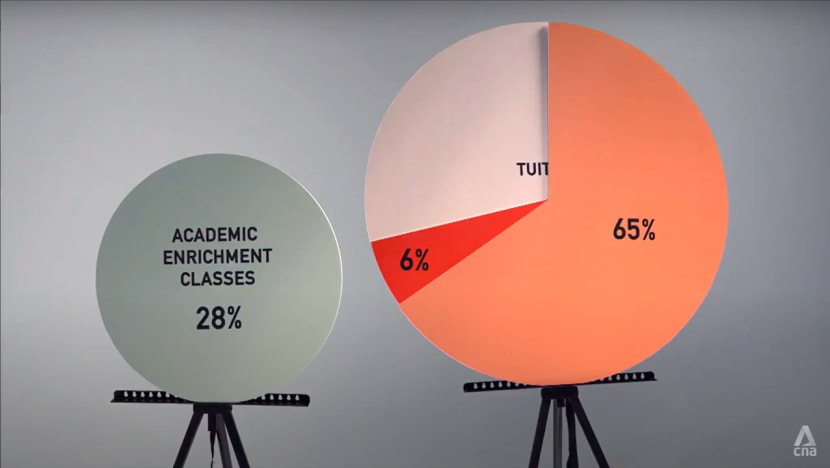
More parents send their children to tuition classes than to enrichment classes.
To hear from the children themselves, CNA conducted a social experiment with 20 Primary Five and Six pupils — from schools across Singapore — to find out the biggest contributor to stress for them.
It happened that for all 20 pupils, their parents have sent or would be sending them to tuition classes to prepare for the PSLE. And it is one of the ways parents have put pressure on children.
“If I don’t do that well, then (my parents) will be kind of disappointed because they’ve already put a lot of money into tuition,” said Zavier Pay.
The 12-year-old was not surprised to find that he was also one of 11 pupils whose parents have compared their grades with their friends’ grades. “A lot of parents also like to compare (grades),” he said.
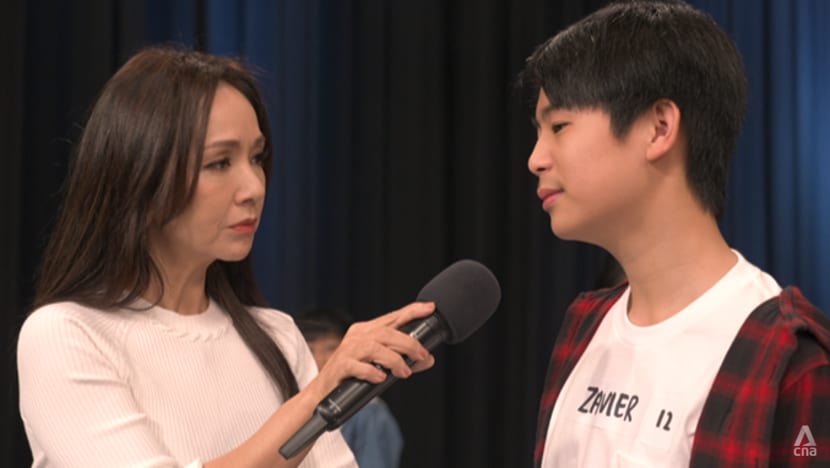
Ser interviewing Zavier Pay, 12.
Among the minority who believed that good grades were not important to their parents was Claire Cher. But the 11-year-old’s parents still send her for tuition and compare her results with her friends’ results.
“They want me to do better than average at least,” she said. While the best she has scored is AL1 in science, she did not think her parents “really put a lot of focus on it”.
“They’re more focused on my other subjects, (where) I didn’t do so well.”
Sometimes educators are a source of stress too. For example, 15 of the 20 pupils agreed their teachers often emphasise the importance of the PSLE, while 11 pupils have teachers who announce the top scorers in tests or exams.
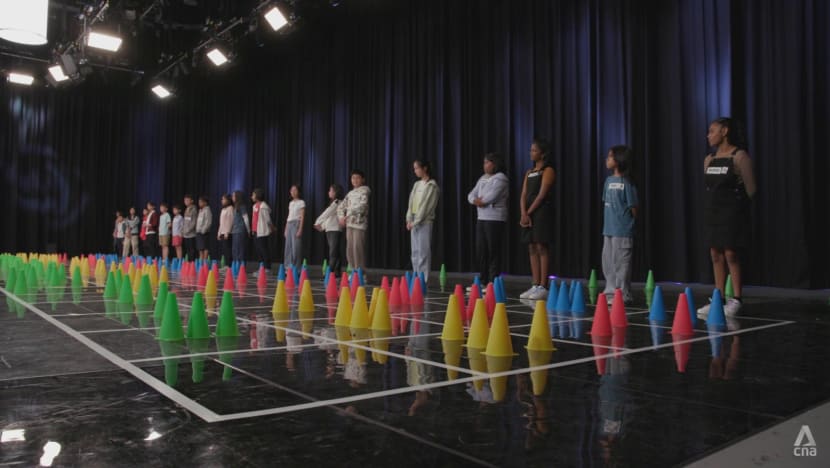
A social experiment involving Primary Five and Six pupils finds out their biggest source of stress. Blue cones represent parents, red is for self, yellow is for teachers and green is peer pressure.
“My Chinese teacher was reading out (scores) from highest to lowest, and then I was one of the last 10 people,” recounted Tan Le En, 12, who was “kind of sad” when her name and score was read out.
“It’s like — the class (is) split into four, (and) that bottom left-hand corner is all the people who score quite low.”
There is also self-imposed stress, but parents remain the biggest stressor. From the pupils’ responses, it also seemed that the children’s self-imposed stress has inadvertently come from their parents.
Kuah Ming You, 11, thinks he sometimes places stress on grades because he wants to get into “a good secondary school of (his) choice so it can help (him) further in life”.
Who told him that? “My parents,” he replied.
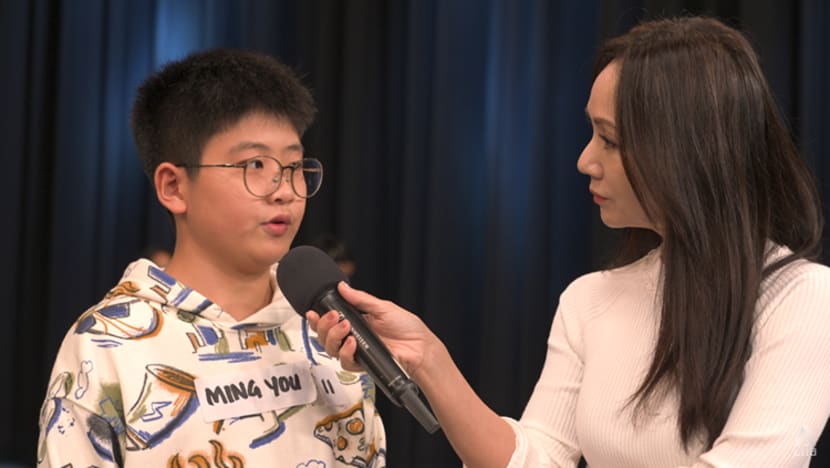
Kuah Ming You thinks good grades mean a brighter future, is disappointed when he gets a bad grade and would consider himself a failure if he does not get his hoped-for PSLE results.
Regardless of the source, stress does accompany the PSLE. Ayra Qirin Mohammad Shahrizal, 12, one of three Primary Six pupils CNA followed over eight months — along with Caleb and Adyant — shared how things were seven days before her exam began.
“I have difficulty sleeping at night,” she said. “When I’m studying also, my mind would drift off to thinking what questions will come up in the PSLE.”
Do parents know how exactly the stress is affecting their children?
Zavier’s mother, Amy Eng, said there are times when his results are “not so good” and he would say, “Mummy, I’m sorry. I’ll try harder.”
While that makes her feel guilty, she believes every parent has expectations when it comes to grades, since they determine school admissions.
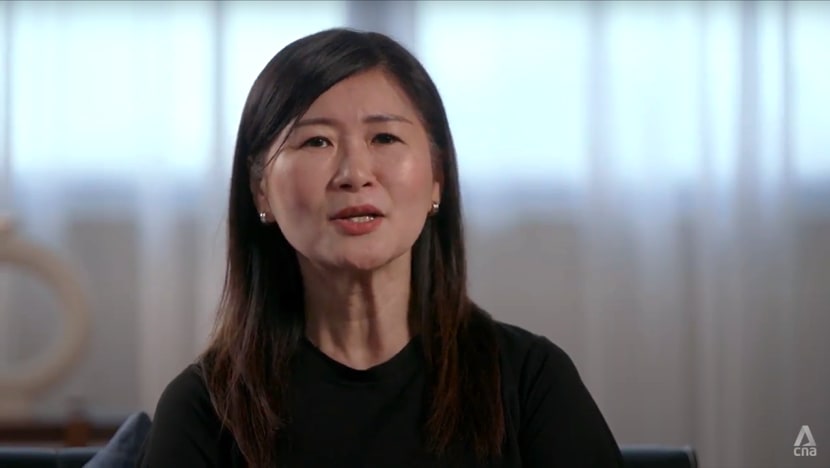
Amy Eng said her son Zavier, as a student, has a “responsibility … to get good grades”.
Claire’s father, Dean Cher, thinks “it’s very clear” that children pick up on their parents’ reaction to their grades.
“I tell them it’s my job to work, it’s your job to study,” he said. “We also tell them that they’re actually not competing with anyone but themselves.”
When he asks Claire how well she thinks she has done, he may find out how others have done, to give her a “sense of benchmark”. He presumed this was why her impression is that her parents compare grades.
He cited a lack of class ranking — part of changes in the education system in recent years, which include the removal of mid-year exams and schools conducting no more than one weighted assessment per subject per school term.
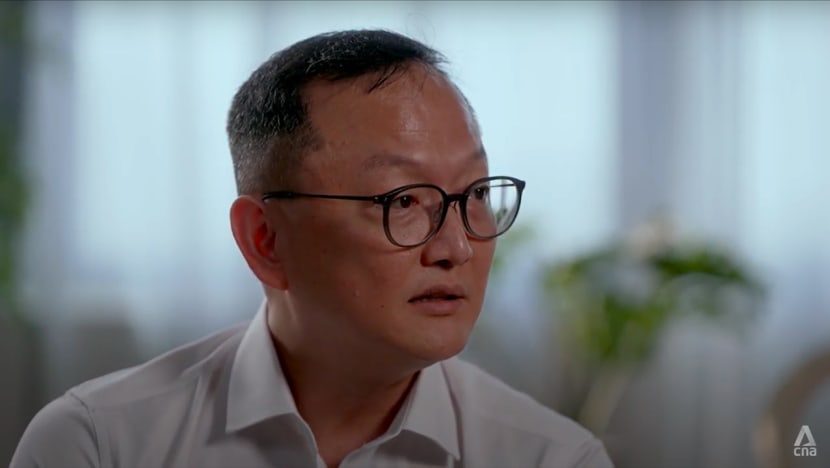
Earlier, Dean Cher had watched the clip from Regardless of Grades in which his daughter Claire was interviewed.
“Perhaps it’s this lack of information that’s then creating a need (for) parents to get more information,” he said.
As for Eng, the education reforms did not help with the peer pressure she felt among friends who are like, “Oh, your son’s (taking the) PSLE this year? What have you done?”
What she then did was to send her son to a tuition centre that a friend suggested.
If her story has a familiar ring, it is because Asian parents “put a lot of stock” in how their children do in education, noted Cher. “That kind of mentality is … insidious, whether you like it or not.”


This could also explain why 56 per cent of parents in CNA’s survey have taken or are considering taking paid leave to prepare for the PSLE — as Ong had done to revise with Caleb.
When there were seven days to the exam, she asked him if he was upset with her for pushing him to study. He said yes and no. “I should have some playtime,” said Caleb, who was allowed “zero games”.
Yet, now that it is over and he has started at secondary school, he told CNA: “If we (hadn’t had) the preparations before PSLE, we’d be struggling … because there’s much more work that we need to do in secondary school.”
And at the secondary school level, “grades still matter”, said Ayra. “Your future is dependent on your grades.”
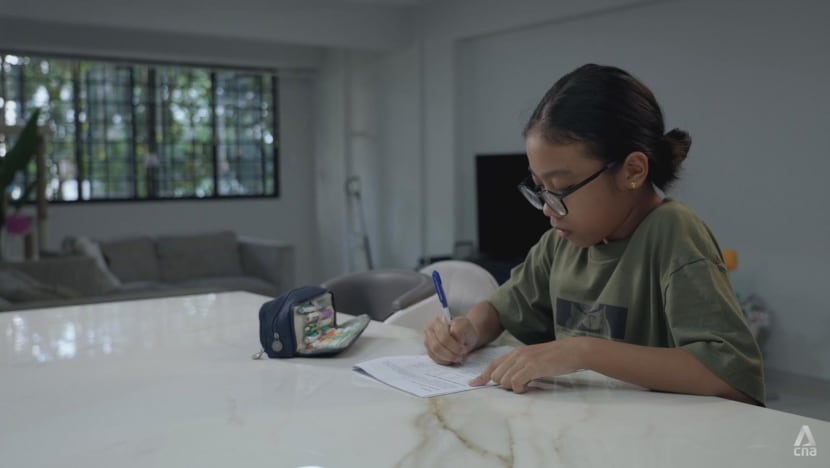
Ayra Qirin Mohammad Shahrizal revising at home before her PSLE. She was “shocked” and “happy” about her results.
Imagining their own future as parents, she, Caleb and Adyant all agreed their children should sit the PSLE.
“It’s a learning point for everybody,” said Adyant. “But then, I really want the PSLE to be postponed to (age) 14 to 16.”
Agreeing, Caleb said the children would be “more mature”, and then parents “won’t be so stressed”. To make the exam less stressful today, he suggested this: “Less nagging and probably (being) more encouraging would do the trick.”
Watch the programme Regardless of Grades tonight (March 29) at 9pm SG/HK, and find out if Caleb, Ayra and Adyant got into the school of their choice. Also catch these digital exclusive clips in which Education Minister Chan Chun Sing talks to Diana Ser, addresses questions from children and CNA viewers; and a PSLE chief marker shares insights into the marking process.
Continue reading...
If there was no schoolwork planned, there would be tuition work. And if not the latter, then there were assessment books to complete, said Caleb, 12, about his holiday schedule.
He was not the only one at home doing revision.
“To help Caleb with science, I tried to memorise the science notes that were given to him,” said Ong, who began taking half-day leave by the time it was the September term break.
Some parents are going one step further. They are attending tuition workshops to be better prepared for their children’s PSLE.

A parent workshop on the PSLE science topic of forces and energy.
For parent Karen Law, attending a workshop this January made her “feel more confident” about covering her son’s science topics.
“When I go through his papers or his homework, maybe I’ll have a better understanding of whether he’s doing it right,” she said. “I just want to make sure that everything’s on track.”
Another workshop participant, Denise Chow, said the key takeaways from their session were the “common pitfalls” of PSLE science and “answering techniques”.
“I can’t go (into) battle for (my son). But I can prepare with him for the battle,” she said.
“I always give (my children) the (freedom) to choose what they want in life. But there are bases of life choices that I have to be part of, and grades and education are a very important thing to me.”

Television host Diana Ser interviewing Denise Chow (right) and Karen Law (centre).
Indeed, according to a survey of 1,000 parents of Primary Five and Six pupils, 99 per cent said good PSLE scores were important.
This is the first such nationwide survey — commissioned by CNA — since the change of scoring system in 2021 from the T-score to Achievement Levels (ALs).
In the survey, 85 per cent of parents also said their children were stressed out about the PSLE, while 64 per cent of parents themselves were stressed out.
Parents are in fact “more stressed” since the change of scoring system, observed science tutor Jayce Or, who started PSLE prep workshops for parents in 2017.
What is driving the obsession with grades, and what is it doing to Singapore’s children? The programme Regardless of Grades, which airs tonight (March 29), finds out how much has changed since the recent moves to reduce the overemphasis on academic results.
WHAT A GOOD SCORE MEANS
Under the current PSLE scoring system, which spans eight ALs, the total scores range from four to 32, which are “less finely differentiated” — as intended by the Ministry of Education (MOE) — than the previous range of more than 200 aggregate scores.
For example, the previous grade A, which was 75 to 90 marks, is now split into AL2 (85 to 89), AL3 (80 to 84) and AL4 (75 to 79), with AL1 for 90 marks and above.
But in the past, pupils could “drop two to four marks” and still get an A, said Or, the founder of enrichment centre Germinate Learning.

Ser speaking to science tutor Jayce Or.
Parents of children scoring within this range are now more stressed because “any careless mistake”, he said — citing PSLE science multiple-choice questions, which carry two marks each — could mean the difference between, say, AL2 and AL3.
That difference in grade could have an impact on a child’s admission to a particular secondary school, if they do not achieve the cut-off score.
And getting into a secondary school of their choice is what lies behind most parents’ views on PSLE scores.
According to CNA’s survey, 69 per cent listed this as a reason why grades were important. And 64 per cent said a good score was a stepping stone to a good future or career.
Related stories:


For one Primary Six pupil last year, Adyant Chandrasekar, his careless mistakes “here and there” were the reason why his father sent him to a mathematics boot camp.
“My dad’s trying to make me get full marks,” the 12-year-old told CNA on the second day.
These kinds of boot camps are typically held during school holidays, and many of them focus on helping Primary Five and Six pupils prepare for the PSLE.
Fees can go up to S$500 for a five-day camp, but it could still be oversubscribed.

Adyant Chandrasekar, 12, at his mathematics boot camp.
Caleb, too, was at a boot camp during the September term break, which led him to express tiredness and question why his mum had enrolled him in the camp. “But I know that it’s for my own good,” he said.
Nowadays, regular tuition is not enough for some parents. Besides boot camps, there are academic enrichment centres offering unconventional teaching methods, from memory practices that stimulate the right brain — or so it is claimed — to speed calculations.
CNA’s survey found that 28 per cent of parents have enrolled their child for such enrichment classes in preparation for the PSLE.
Most parents (60 per cent), however, send their children to tuition classes. Among them, 65 per cent send their children to three or four classes, and for another 6 per cent, it is five or more classes.

More parents send their children to tuition classes than to enrichment classes.
THE BIGGEST STRESSOR
To hear from the children themselves, CNA conducted a social experiment with 20 Primary Five and Six pupils — from schools across Singapore — to find out the biggest contributor to stress for them.
It happened that for all 20 pupils, their parents have sent or would be sending them to tuition classes to prepare for the PSLE. And it is one of the ways parents have put pressure on children.
“If I don’t do that well, then (my parents) will be kind of disappointed because they’ve already put a lot of money into tuition,” said Zavier Pay.
The 12-year-old was not surprised to find that he was also one of 11 pupils whose parents have compared their grades with their friends’ grades. “A lot of parents also like to compare (grades),” he said.

Ser interviewing Zavier Pay, 12.
Among the minority who believed that good grades were not important to their parents was Claire Cher. But the 11-year-old’s parents still send her for tuition and compare her results with her friends’ results.
“They want me to do better than average at least,” she said. While the best she has scored is AL1 in science, she did not think her parents “really put a lot of focus on it”.
“They’re more focused on my other subjects, (where) I didn’t do so well.”
Sometimes educators are a source of stress too. For example, 15 of the 20 pupils agreed their teachers often emphasise the importance of the PSLE, while 11 pupils have teachers who announce the top scorers in tests or exams.

A social experiment involving Primary Five and Six pupils finds out their biggest source of stress. Blue cones represent parents, red is for self, yellow is for teachers and green is peer pressure.
“My Chinese teacher was reading out (scores) from highest to lowest, and then I was one of the last 10 people,” recounted Tan Le En, 12, who was “kind of sad” when her name and score was read out.
“It’s like — the class (is) split into four, (and) that bottom left-hand corner is all the people who score quite low.”
There is also self-imposed stress, but parents remain the biggest stressor. From the pupils’ responses, it also seemed that the children’s self-imposed stress has inadvertently come from their parents.
Kuah Ming You, 11, thinks he sometimes places stress on grades because he wants to get into “a good secondary school of (his) choice so it can help (him) further in life”.
Who told him that? “My parents,” he replied.

Kuah Ming You thinks good grades mean a brighter future, is disappointed when he gets a bad grade and would consider himself a failure if he does not get his hoped-for PSLE results.
Regardless of the source, stress does accompany the PSLE. Ayra Qirin Mohammad Shahrizal, 12, one of three Primary Six pupils CNA followed over eight months — along with Caleb and Adyant — shared how things were seven days before her exam began.
“I have difficulty sleeping at night,” she said. “When I’m studying also, my mind would drift off to thinking what questions will come up in the PSLE.”
KEEP OR DUMP THE PSLE?
Do parents know how exactly the stress is affecting their children?
Zavier’s mother, Amy Eng, said there are times when his results are “not so good” and he would say, “Mummy, I’m sorry. I’ll try harder.”
While that makes her feel guilty, she believes every parent has expectations when it comes to grades, since they determine school admissions.

Amy Eng said her son Zavier, as a student, has a “responsibility … to get good grades”.
Claire’s father, Dean Cher, thinks “it’s very clear” that children pick up on their parents’ reaction to their grades.
“I tell them it’s my job to work, it’s your job to study,” he said. “We also tell them that they’re actually not competing with anyone but themselves.”
When he asks Claire how well she thinks she has done, he may find out how others have done, to give her a “sense of benchmark”. He presumed this was why her impression is that her parents compare grades.
He cited a lack of class ranking — part of changes in the education system in recent years, which include the removal of mid-year exams and schools conducting no more than one weighted assessment per subject per school term.

Earlier, Dean Cher had watched the clip from Regardless of Grades in which his daughter Claire was interviewed.
“Perhaps it’s this lack of information that’s then creating a need (for) parents to get more information,” he said.
As for Eng, the education reforms did not help with the peer pressure she felt among friends who are like, “Oh, your son’s (taking the) PSLE this year? What have you done?”
What she then did was to send her son to a tuition centre that a friend suggested.
If her story has a familiar ring, it is because Asian parents “put a lot of stock” in how their children do in education, noted Cher. “That kind of mentality is … insidious, whether you like it or not.”
Related articles:


This could also explain why 56 per cent of parents in CNA’s survey have taken or are considering taking paid leave to prepare for the PSLE — as Ong had done to revise with Caleb.
When there were seven days to the exam, she asked him if he was upset with her for pushing him to study. He said yes and no. “I should have some playtime,” said Caleb, who was allowed “zero games”.
I’m angry that the MOE created the PSLE. Can’t it just be like the normal exams?”
Yet, now that it is over and he has started at secondary school, he told CNA: “If we (hadn’t had) the preparations before PSLE, we’d be struggling … because there’s much more work that we need to do in secondary school.”
And at the secondary school level, “grades still matter”, said Ayra. “Your future is dependent on your grades.”

Ayra Qirin Mohammad Shahrizal revising at home before her PSLE. She was “shocked” and “happy” about her results.
Imagining their own future as parents, she, Caleb and Adyant all agreed their children should sit the PSLE.
“It’s a learning point for everybody,” said Adyant. “But then, I really want the PSLE to be postponed to (age) 14 to 16.”
Agreeing, Caleb said the children would be “more mature”, and then parents “won’t be so stressed”. To make the exam less stressful today, he suggested this: “Less nagging and probably (being) more encouraging would do the trick.”
Watch the programme Regardless of Grades tonight (March 29) at 9pm SG/HK, and find out if Caleb, Ayra and Adyant got into the school of their choice. Also catch these digital exclusive clips in which Education Minister Chan Chun Sing talks to Diana Ser, addresses questions from children and CNA viewers; and a PSLE chief marker shares insights into the marking process.
Continue reading...


